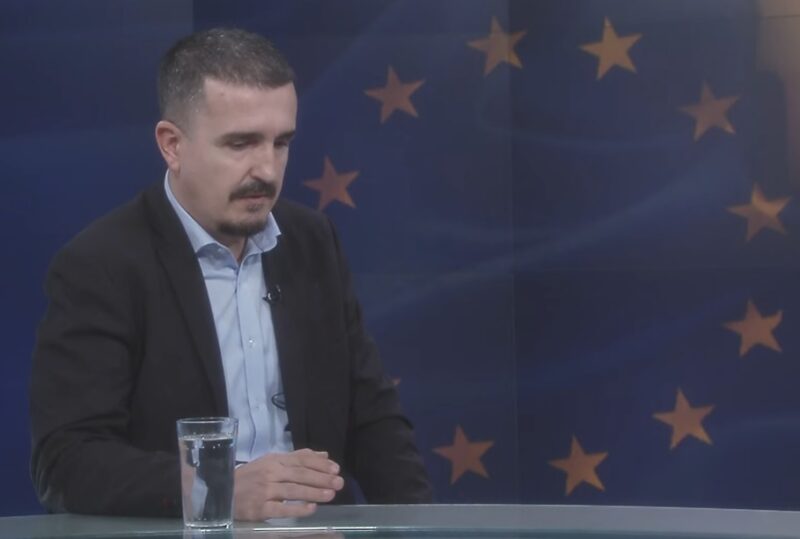After the Methodology and the European Political Community, Macron comes up with another, old idea: Europe of two speeds. All these ideas have slowed down the integration process in the Western Balkan countries in the EU. In the case of North Macedonia, there may be serious political consequences, considering that the process of constitutional changes has already begun.
Author: Xhelal Neziri
The former German chancellor, Angela Merkel, proposed a two-speed European Union (EU) in 2011. This idea, also discussed with the then French president, Nicolas Sarkozy, aroused many debates, reactions and doubts among the members of Eastern Europe, but also among the aspirant countries. The idea of a Europe of two or more speeds is as old as the EU project itself, and implies different levels of integration. And this EU to some extent is a reality as not all EU members are equally integrated. In addition to being a member of the Union, there are two other levels – the Eurozone and the Schengen Area.
But, now that the expansion of the EU towards the Balkans is becoming a geopolitical emergency, new models of deepening are required again.
The current president of France, Emmanuel Macron, revived the idea of a two-speed Europe. A year ago, during a lecture at the University of Prague, German Chancellor Olaf Scholz also asked for this. This hints that this idea continues to develop even after the departure of Merkel and Sarkozy from the European political scene. It is becoming a constant that aims to turn into a plan that aims to make the EU more efficient but less fair. This is because a large part of decisions will no longer be made by consensus by all members, but by members who have the economic and political power to implement those decisions. This means that countries that are not part of the Eurozone will be given the right to block the European budget or those that are not part of the first six founding countries of the EU will be given the right to veto strategic decisions. of the EU.
President Macron opened the debate on “Europe of two or more speeds” again, as four years ago he opened the debate on the new methodology of membership negotiations, or a year ago he launched the idea of establishing the European Political Community. All his ideas are accepted and implemented, but the integration of the six countries of the Western Balkans (Albania, BiH, North Macedonia, Serbia, Montenegro, Kosovo) is increasingly delayed.
The fact that since 2013 the European Union has not accepted any new members is causing frustration among the leaders of this region. At the Bldei forum, the Albanian Prime Minister, Edi Rama, even made fun of the expansion of the EU for the assessment to happen. “If you think of integrating Ukraine into the EU faster because of the war, then show that we also start fighting each other,” said Rama. From last year, Ukraine and Moldova also received the status of candidate countries, becoming a total of 8 countries in the European antechamber. Not even the warning of the president of the EU Council, Charles Michel, that until 2030 the enlargement should take place, softened the criticism of the Balkan leaders. Even more so when Mischel was “reprimanded” by the president of the European Commission (EC), Ursula von der Leyen, who said that the focus remains on fulfilling the criteria, not on the dates.
This frustration is to be expected after almost ten years of closing Europe’s doors. The enlargement process even marked a setback: in 2016 Great Britain left the Union.
This is the longest delay in EU enlargement since 1957. In this year, Germany, France, Italy, the Netherlands, Belgium and Luxembourg laid the foundations of the Union. It took 16 years for this Union in 1973 to expand with Great Britain, Denmark and Ireland. Thus, the EU grew from 6 to 9 members. The subsequent expansion dynamics have been faster, making the EU count today at 27 members. The last country to join was Croatia in 2013.
North Macedonia first signed the Stabilization and Association Agreement in 2001 and gained candidate country status in 2005, when Serbia and Montenegro were still a federation. In 2009, it received the first recommendation of the European Commission for the start of negotiations. However, the negotiations were prevented due to the veto by Greece on the name, by France on the new Methodology and recently by Bulgaria on the history.
A week ago, the country started the process of constitutional changes to implement exactly the French proposal, which removed the Bulgarian veto. This proposal calls for constitutional changes in the RMV so that, among others, ethnic Bulgarians are also included in the preamble. The opposition VMRO-DPMNE, whose votes are key to pass the changes in the Parliament, asks the government to wait and not implement the Proposal. Macron’s idea seems to go in favor of this attitude, even though separating the RMV from the package with Albania and leaving it in a group with BiH and Kosovo undoubtedly brings great risks. This was also said by the senior American diplomat, Gabriel Escobar, during his visit to Skopje last week.
A new crisis may erupt again due to the lack of a clear European perspective. Balkan conflicts often erupt into conflict.

